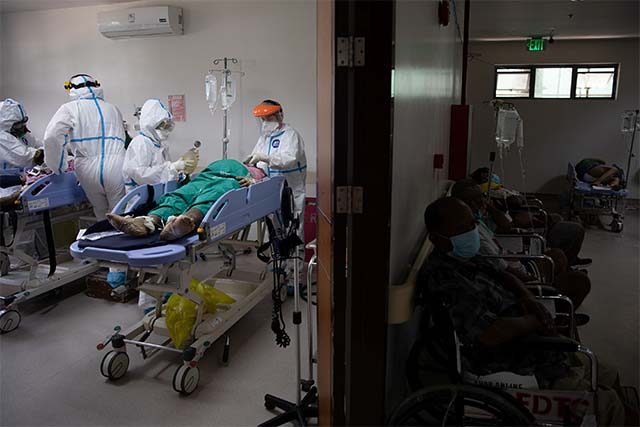
Health Undersecretary Maria Rosario Vergeire admitted on Tuesday that local hospitals have already reached the “danger zone” in accepting patients with COVID-19.
Vergeire defined danger zone as the instance when confirmed cases occupy more than 70% of the hospital beds allotted to them.
“Katulad ng nabanggit ni Dr. (Rustico) Jimenez and (DOH) Usec. (Leopoldo) Vega yesterday, we are in the danger zone. Ibig sabihin more than 70 percent na po ang utilization ng COVID beds natin,” she said in an interview with ABS-CBN’s Teleradyo.
She was referring to the same statement of Dr. Rustico Jimenez, president of the Private Hospitals Association Philippines Inc., who also bared that 10% of around 400 private hospitals in Metro Manila have declared full capacity in terms of accommodating COVID-19 patients.
Vergeire also noted that hospitals are complying with Health Secretary Francisco Duque III’s instruction to expand their units amid the surge in cases.
Hospitals in the National Capital Region, where the majority of the cases in the country are confined in, are ordered to allot 30% of their beds to COVID-19 patients.
Therefore, when the management of the hospital announces that it is no longer accepting patients with the deadly virus or they have reached “full capacity,” this means that the required 30% bed space is already filled.
Last week, presidential spokesperson Harry Roque denied that hospitals have breached the 30%-mark during the regular virtual presser last July 6.
“Hindi pa po nabi-breach itong 30% na ito. Bakit po? Kasi marami po, lalung-lalo na iyong mga pribadong ospital, less than 30% ang kanilang ina-allot po dahil doon sa tinatawag nilang absorptive capacity,” he said.
At that time, Roque said private hospitals requested to allot only 20% first of their capacity and then increase if needed.
“Pinag-uusapan pa po iyan, pero malayo pa po tayo doon sa 30% hospital bed allotted for COVID cases,” he said.
Prior to this, two private hospitals declared they could no longer accommodate individuals who have acquired the deadly pathogen.
Then, on July 14, more hospitals in the capital announced full capacity as well. But for Roque, this critical juncture remains “manageable.”
Health facilities that reached full capacity for COVID-19 cases
Last June 22, the Chong Hua Hospital in Cebu City was the first to issue a statement on Facebook that it reached its full capacity of COVID-19 patients.
“Presently, we are caring for over 180 COVID-19 confirmed, probable and suspect patients while having more than 120 of our very own staff on quarantine,” its statement read.
Dear Loyal Patients of Chong Hua Hospital,We wish to inform you that Chong Hua Hospital, despite having the greatest…
Posted by Chong Hua Hospital on Monday, June 22, 2020
Last July 6, the Chinese General Hospital in Manila told CNN Philippines that it could no longer admit COVID-19 patients and even suspected cases.
Since Monday, July 13, four big public and private hospitals in Metro Manila announced the same on their respective Facebook pages.
- National Kidney and Transplant Institute in Quezon City
- Makati Medical Center in Makati
As Makati Medical Center attended to thousands of CoViD-19 suspected patients since the outbreak, the hospital has once…
Posted by Makati Medical Center on Monday, July 13, 2020
- Luke’s Medical Center in Taguig and Quezon City
Posted by St. Luke's Medical Center on Sunday, July 12, 2020
- The Medical City in Pasig City
The Medical City Advisory. July 14, 2020.
Posted by The Medical City on Monday, July 13, 2020
Last March, back when confirmed and suspected cases are low, some of these medical institutions and other facilities have also been “at full capacity,” which definition previously included inadequate protective gear for the health workers.
Jimenez of the Private Hospitals Association Philippines Inc. cited the public’s preference for staying in hospitals instead of the government’s isolation facilities as among the reasons why these hospitals have many patients.
“Kaya lang po karamihan ng mga pasyente ayaw naman lumipat doon dahil natatakot, dahil siyempre malayo sa bahay nila,” he said.









